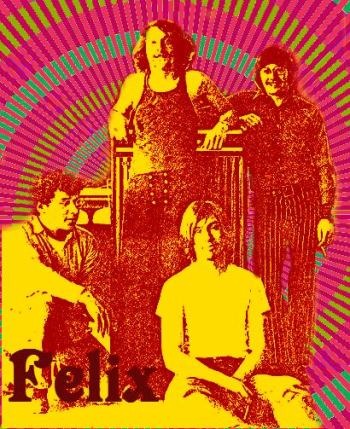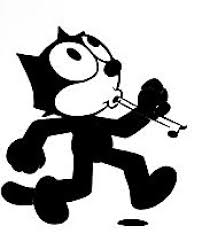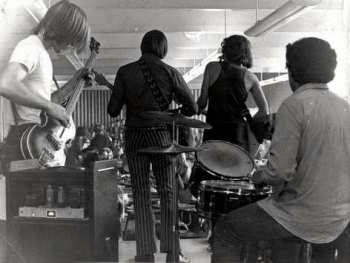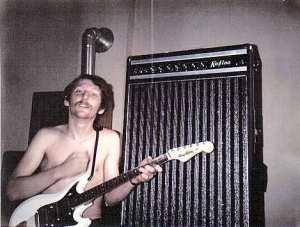Tags
Classic Rock Collectibles, Felix The Band, Guitars, Hippies, Humor, Performing, Psych, Small Country Towns, The Blues, THE VELVET ILLUSIONS
Have you ever operated in a vacuum? I’ve operated a band in a vacuum. That is, I had a really good band, but it was in the wrong town, where there were too few audience members, and no music industry to become involved in. Here is the story.
When you assemble a blues band in a small, conservative, economically-challenged town, well, you really have a blues band! That is to say, you have a reason to be singing the blues. If you are looking to be super-popular, you are setting yourself up for disappointment. You’ll be misunderstood by scores of people your own age, who just don’t “get” what you are trying to do. You will probably have trouble getting booked. And you will most likely have to take solace in the fact that you made good music, even though, in the end, the whole thing went nowhere.
In spite of the above drawbacks, I did it: I put together a unique, driving blues band in a small town. I’m glad I did. We (Felix) didn’t have the biggest crowds in town, just the best crowds. Our psychedelic jamming, combined with the themes and chord progressions of the blues, went over very well with the relatively few long-haired hippies and free-thinkers in our home town of Yakima, Washington, the little Eastern WA agricultural center located near the river it was named after, which I have written about often.

The Fluorescents, including Stan Ruehlow, drums; Chuck Gregory, guitar, Bill Everett, gargantuan saxophone.
The birth of Felix:
Yakima was, and still is, home to a great musician/guitarist/singer, Chuck Gregory, founder and leader of the legendary “Fluorescents”. Chuck formed the rootsy rock group in the early 1960’s. They were famous for shining a black light on their drummer’s sticks, which had been painted with day-glo paint, while the house lights were turned down. The drummer, who was often my great friend Stan Ruehlow, would play a flashy solo. And all the audience could see would be his brightly glowing sticks! I remember seeing the band play at the Yakima armory when I was about 13. They performed their trick with the glow-in-the-dark sticks, and I was amazed! Chuck and the guys were also famous for their great renditions of Buddy Holly songs, like “Slippin’ and Slidin’”. And when they played Louie Louie, their sax man played a huge bass sax to start the song. That was a really shack shaker!
Coincidentally, my teenage psychedelic/garage band, the Velvet Illusions, regularly competed against the Fluorescents in battles of the bands, in 1966 and 1967, so I got to know Chuck. I’ve told that story. — Well, Chuck has continued to perform throughout the Yakima area since founding the Fluorescents way back then. And, he’s gone on to start other great bands around town, including a heavy blues band he called The Suun. When the time came, and he decided to leave The Suun, for whatever reason(s), I took over as their band leader. The remaining musicians needed someone who could “front” the band, play lead guitar, and sing. I was looking for some good players, and they were, it turned out, looking for me!
Well, you know what happens with bands: membership changes take place. And we had them. After a few membership and direction changes, I decided to change the name of the band, too. — To reflect that we really were new and different. The name I chose was “Felix”. I named the group after the famous cartoon cat. He was my Daddy’s favorite cartoon when he was a kid. Our drummer, Paul Hernandez, featured the black cat’s picture on his bass drum. (I always wanted to be a drummer, BTW. But Mom and Daddy got me a guitar when I turned 14. I’ve written whole stories about drummers — I idolize them. They are always together, waiting for the band to get it together.)
We put together a set list composed of psychedelic blues, “boogie music” and roots rock, a la early Creedence Clearwater Revival. We paid tribute to my all-time favorite band, Canned Heat, by playing their “Fried Hockey Boogie”, all 40+ minutes of it, as well as several of their other great songs. No other bands in Yakima seemed to be covering Creedence or Canned Heat in 1970. I also wrote some of our songs. I wrote them in the style of “heavy” rock, or blues. I wove the most interesting guitar leads I could into my original songs. I knew I was going to have to make them pretty special if we were going to play them side by side with songs made famous by the big groups. And people complemented them, and even requested them, so I think I did OK. I knew, when the floor filled with dancers, for up to 20 minutes at a time, that my songs were going over just as well as the Canned Heat songs, and the Crosby, Stills and Nash songs we covered. It felt good!
I’ve led or been a member of dozens of bands, since I began playing in 1963. Felix was my favorite, because we played whatever we wanted, including those originals of mine, and also because of the great guys I was privileged to play with: Yakima’s Don Davis was a rock-steady, imaginative, supportive rhythm guitarist who possessed a clear tenor voice. — Perfect for singing harmony to my leads. Mabton’s Larry Brown was one of the best bassists I’ve ever had the pleasure to mesh notes with. He always knew just what to play. And he insisted on being the one who decided what he should play. He only had to say once, “Randy, don’t tell me what to play”. — I knew he was right! And, finally, Grandview’s Paul Hernandez was a drumming juggernaut. When I first met him, he had a nice, soft touch on the drums, which I immediately starting working on, to help him lose! His drumming style definitely changed to what one would call “heavy”, which fit our music. When I think back 45 years, I can still see Paul working his butt off, sweating profusely, as he played his great solo in the Canned Heat Boogie.

Your left: Paul Hernandez, drums; Randy Bowles, everything; Larry Brown, bass; Don Davis, guitar. — Just a bunch of friendly, mellow fellows.
We truly worked together in this band. We were buddies. Our sound was smoothly meshed: we arrived at our sound, by each member playing his own small part. When we put all four parts together, they fit; and the results made people feel good. We really communicated to our audience the sense of joy, freedom and enthusiasm we felt. At the same time, we featured songs that would make people think. Among the songs I wrote, we performed “The Gap”, which was about the generation gap. It was about giving the younger generation a chance to go its own way – to make its own decisions. Well, now we are the older generation. Funny how the worm turns! – We also did a gospel-rock song I wrote, “One Way: Jesus”. There were a lot of “Jesus People” in Yakima in 1970 and 1971, and I think that influenced me to write the song. I also penned one entitled, “You Need Me”, a heavy blues number played in a minor key, written to hopefully win a woman’s love. We performed an anti-drug song entitled “Pills”, written as a message to a friend of ours who was getting way-in over his head with drugs. He wasn’t just “experimenting” like most of our crowd. He was wrecking his life. — I’ve always used music to convey a message. Sometimes it’s a message of love, sometimes it’s political. But in the case of “Pills”, I unabashedly stated my feelings about not wanting to see a friend throw his life away, for a thrill.
In the truest DIY form, we regularly rented the Civic Center in Mabton, Washington, a really small agricultural town, where we proceeded to put on our own dances. Hundreds of young, rural kids would pay a couple of dollars apiece to hear us play several hours of music. We played as long, and as LOUD as we could! You may wonder what the city fathers and mothers thought of us presenting “hippie dances” in their little country town. Actually, they were happy that we gave the kids something to do. Due to a city ordinance, we had to hire an off-duty Mabton cop to provide security. He soon became our pal. Nothing made him happier than to see us have a big night, with a large crowd. He would much rather see the kids all together, safe, having fun, than out in their cars, racing around the countryside, while drinking and/or drugging. Not that our dances were entirely free of drug activity. I was in charge when we produced a dance, so I was always busy setting up, making sure tickets were getting into the kids’ hands, playing the music. But I heard that people were selling hits of acid at the door. Maybe so. I never saw it happen. — At least we kept the kids safe; and at least, their parents and one off-duty Mabton cop knew exactly where they were.
One night at the Mabton Civic Center, however, we found our super-terrific bassist Larry Brown himself loaded on LSD. We had a very large crowd; I had come all the way from the “bigger-small town” of Yakima to play; I was totally amped-up and ready to bleed onstage if that what it took, and Larry’s f’ing bass guitar turned into a large piece of rubber. At least 1) that’s what it sounded like, and 2) that’s what he told us later. I had something to tell him, too: “I don’t care how much I like you, or how good a bass player you are. Don’t you ever drop acid to play a Felix gig again!” And he didn’t!
Why was I was so upset? Imagine a drummer who has mastered his craft, who knows the style, who is ready to deliver; imagine a rhythm guitarist who knows all the chords, and is there for you, ready to lay down the perfect soundscape for you to solo over; imagine yourself, ready to just nail all the high notes your 4-pickup guitar contains, ready to soar on the vocals, ready to bring the crowd to a sweaty frenzy. And your crack bassist, who has previously, totally delivered the goods, now thinks his instrument is Gumby. Oh, the humanity.
We played high school dances all around Yakima, but not usually in Yakima. However, we did play shows at Yakima Valley College, the higher learning institution which we laughingly described as a high school with ashtrays. We produced and played two hippie dances at YVC in 1970 and 1971 — two of the few “tie-dyed-in-the-wool” hippie dances ever presented at YVC. We somehow tricked the school into letting us do it. In both cases we offered to play a free, preview lunch concert in the Student Union Building, or whatever they called it. I can say from watching from the stage, that quite a few students were more than a bit surprised to hear heavy blues roaring out of huge amps during their mid-day repast. We were loud, slow and lumbering, like a train rolling through the Valley. We did not play “Hanky Panky” by Tommy James and the Shondells.
Nope. We did not play the pseudo-psychedelic “Crimson and Clover”. But boy, did the straights in attendance ask for it. Or they wanted to hear, “Gloria”. No way. And, there was no “Brandy You’re A Fine Girl” to be found on our set list. They got what we wanted to give ‘em. Some got mad. But those that liked us, liked us a little bit more each time they heard us turn down a request for “We’ve Only Just Begun”, or “Love Grows (Where My Rosemary Goes)”.
I developed a way to nip the whole “straight person makes dumb song request” thing in the bud. As soon as I saw one walking up to the bandstand, I would make direct eye contact with him, and say, “No”. Usually he would go away. – Now, you may think I was being mean. But remember. In two years, we got two gigs at YVC. The rest of the time, the straights ruled. They got their Bread songs, their “Come On Down To My Boat Baby” – all-a that and more, from their favorite bands, who went by names like “The Polebenders”. What the hell is a Polebender? Even worse, many Yakima-area venues started hiring dorks with record players and big boxes of lame vinyl! They would work for one-fourth the money we called for. My response to the new DJ phenomenon was simply this: play harder, play longer, play better. I saw right away that, if we musicians were going to fight off the DJ thing, it would be due to our getting better, not just getting mad.
We were surely the first, and perhaps the only band to present a light show to accompany our music at YVC. A group of our loyal, wigged-out followers were responsible for this. They hung huge bed sheets behind the stage, and projected a myriad of spacey, psychedelic images behind us while we worked our way through a 45-minute version of Canned Heat’s “Refried Boogie”.

My fellow Washingtonians will need no explanation as to what this is…. And BTW, “No, no, no, no — I don’t smoke it no more”. Thanks, Ringo.
I still remember turning around during our excellent drummer Paul Hernandez’s extended solo, and seeing a beautifully-rolled joint, prominently displayed behind us on the screen. – No, this was not normal for YVC or Yakima. But it was fun.
Did I mention we played loud? Having been accustomed to using Vox Super Beatle guitar amps in my previous band, The Velvet Illusions, I suddenly found myself going through lesser-quality amps left and right, blowing speakers, frying circuits, etc. Heck, I once blew up a Fender Twin Reverb at band practice! And I didn’t own it. It’s not good to blow up borrowed equipment! I finally found and purchased a used Fender Bassman amp which could stand up to the punishment I dealt out. I kept the volume permanently cranked at 10!
Actually, I coveted rhythm guitarist Don Davis’ mighty Kasino amp, because it was the biggest, most powerful amp I’d ever seen. In fact, I was the guy who sold it to him. I was working for a local music store, Maletta-Deccio. I was trying to talk Don into buying this beautiful, expensive amp, so I could make a nice, fat commission. Don said he’d buy the amp if I’d start a band with him. Well, Felix was kind of on hiatus at that time. So, I sold him the amp, and we restarted the group.
Since the four of us were not just a band, but close friends, we hung out often. We practiced a lot, but we also just hung together. Often, in our leisure time, we’d head over to a little cafe in “downtown Mabton”, take up a couple of booths, where we would be joined by the pretty, young Mabton girls, and we’d enjoy the down-home food they fed us, while we fed the jukebox, picking out country songs such as Loretta Lynn’s “Don’t Come Home A Drinkin’ With Lovin’ On Your Mind”, or “Okie From Muskogee”. (We hippies won! — Don’t think so? Check out Merle and Willie’s latest duet, “It’s All Going To Pot”!) But, we used to think those songs were hilarious. We made total fun of country music, just like my Daddy did when he acted out his Cowboy Pinkeye persona on Yakima radio years earlier. (Little did I know that I would eventually leave my heavy blues band, in 1971, to join a country band!)
Let me insert a comment here: I’m not saying we were the only psychedelic/blues/hippie/heavy band in Yakima. There were a few others. Some were very good. I simply can’t remember any of their names! You try going back to 1970 and remembering the names of all the obscure bands from your home town. It’s difficult, if not impossible.
The end:
While we gave many Lower Yakima Valley kids something to do, and in the process, became a big thing in the area, it was difficult to get hired in Yakima proper, because those way-conservative conformists tended to hire Seattle bands, or at least, well-known, tried-and-true, safe, local bands. We were a major alternative, playing our heavier, louder, more inventive non-Polebender music, where one song could stretch on for days.
My original songs were very well received. As I mentioned, they were topical; they made people think. I made sure they contained great guitar solos, but they weren’t about mindless soloing. We had our own sound. We were four highly-skilled musicians. But we didn’t have the wherewithal to make recordings. Had we, I guarantee they would have blown away any of the recordings I made with the Velvet Illusions a few years earlier. But we didn’t record (I’m not even sure where any recording studios were in Yakima in 1971). We hit a plateau, and we stayed there. We just weren’t going to make it, and it was hard to live on the kind of money we were receiving.

Katsuhiko “Katz” Kobayashi, steel guitar; the author, lead vocals/guitar. Not shown, on drums is Tim McKelheer. Sorry for the poor quality of the photo. It’s a treasure, all the same. Old Polaroid snapshot.
So when I was offered the chance to truly make a living in music, even country music, I jumped at it. Tim McKelheer, a really fine Yakima drummer, filled-in for Paul Hernandez at a couple of Felix gigs, and we became pals. He let me know that the world’s best steel guitarist, “Katz” Kobayashi, needed a lead singer/guitarist/front man for his Yakima country band. Tim was Katz’s full-time drummer. He asked me if I was interested in the job. Well, I knew that forming a band with him and two of Tokyo’s finest musicians would be a great honor. I said yes. I auditioned, and landed the job. So, I disbanded Felix and began playing at the Mayfair Tavern, in downtown Yakima with Katz and company, under the moniker of The Mayfair Wagon. You’ve heard that story. This is the story of Felix — a “real” blues band in a town that really had the blues.
————————————————————————————-
Felix’s rhythm guitarist, Don Davis, and I had a reunion via telephone in Spring, 2005. I was working as a phone clerk at a call center, when I picked up a call. As soon as I heard the guy’s voice, I knew, even 35 years later, that it was Don. I asked him for his name, address, phone number – the usual identifiers. Then, I casually asked, “And were you ever a member of the band, Felix?” I could hear him fall off of his chair. – That really happened, folks. Well, when he recovered, and after I helped him with official business, we took a minute to chat. (I could have been fired on the spot.) But, I learned from Don that he and Paul, our hard-working drummer, had continued with their music careers. Don had played in some country bands, too. They were no longer in touch with our bassist, Larry Brown, who’d left for parts unknown. Perhaps he finally blew his mind…. While Don had me on the phone, he played a sample of a cassette recording we had made at band practice all those years ago. How did it sound?
Heavy, man!
Bonus Coverage:
I’ve left country music behind, preferring to play the folk-rock songs of the mid-late 1960’s, in my solo concerts all over Puget Sound. I enjoy every single minute I’m on stage! I’d love to play for you one day. But hurry. I’m 66!
To all the great Yakima metal players, glam rockers and outcast musicians who came after us, let me just say: I know how you must-a felt. We were looked at as very strange fish out of water. But did we have fun? Damn right. Did we blow amps? Like I said, we blew them up during practice. We gave that town a — TKO.
Dedicated to the great Yakima band, TKO, who, while they took a different path, also knew what it was like….

I just put this one here so that Facebook will use it as the thumbnail pic. Its robots pick the last photo in a story, so I have to put one that makes the most sense… — You’re welcome.
[An edit time has forced me to make:] Regarding where I say to hurry up and see me play, because I’m 66: well, now I’m 73. And my passion for music is as strong as ever. I played five gigs this year (2022), here in Seattle. That’s not a lot of gigs; not nearly as many as I could do if asked; but every one of them was a great gig. — I play 3 hour shows (with no break) at Seattle Center’s A/NT Gallery, a multicultural, multimedia artist coop, where we who make the art make all of the decisions. It’s DIY, people. DIY.














Thanks for another great story, Randy. Thoroughly enjoyed this one. Cheers!
LikeLiked by 1 person
Thanks so much! I was curious to see what you would think of it, actually. I worked on it a very long time, trying to remember the more humorous and ironic elements of the story. I can’t believe how I came up with the TKO ending. I am just channeling someone else’s writing. I heard from two members of TKO on FB, and they liked it! 🙂
Your bro must be too busy. I’m sorry ’cause that could have been interesting….
LikeLike
Yes, my brother is quite busy and he’s also a professional cartoonist, so he doesn’t do speculative work. My suggestion would be to find a young cartoonist, perhaps one in college or recently graduated. I’m sorry it didn’t work out with my brother.
LikeLike
It looks like I may have found one. We’re talking about it anyway. She does really strange, innovative, wacky comics.
I’m not sure what speculative means, but I wasn’t trying to do anything other than have a little fun for both of us. Just a little collaboration, purely for fun. 🙂
LikeLiked by 1 person
Very good to know that you may have a cartoonist.
Speculative work is unpaid work with a low possibility of getting paid work. Maybe when he retires, he can do cartooning just for fun.
LikeLike
Mabton’s gain was Yakima’s loss. Sorry I missed you guys somehow, I’d have loved your music! I had a laugh about YVC’s deserved rep as ‘High School With Ash Trays’ ; ) Great story, thanks Randy.
LikeLiked by 1 person
I had a tape of us that was just great. A few years passed, I moved to Seattle, and started my band, Cowboy Pinkeye. We needed a demo tape to apply for the Fremont Fair. I used the blank side of the Felix tape and submitted it. We didn’t get into the Fremont fair, and I didn’t get the tape back. It sounded like the Grateful Dead, only we weren’t copying them on purpose. Mabton never saw the likes of us again! Felix made the Velvet Illusions sound like a bunch of teenagers. Oh, right: we were!
LikeLike